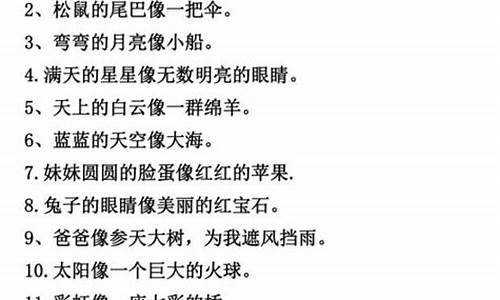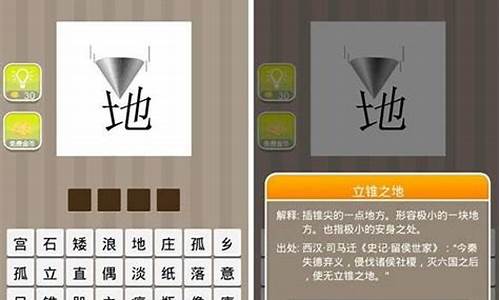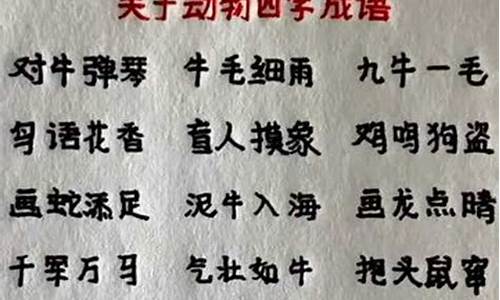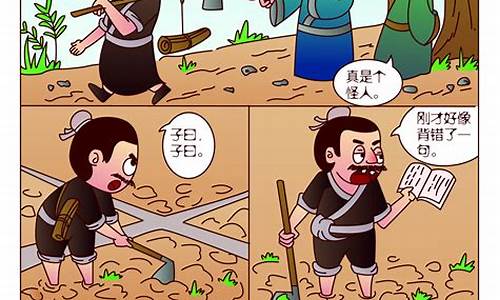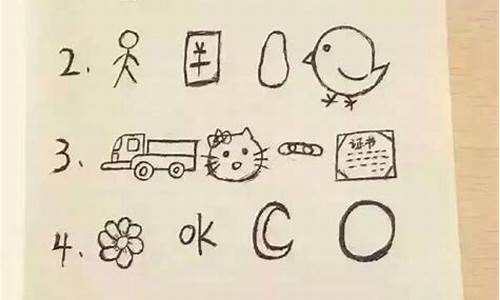四个字成语故事英文怎么写_四个字成语故事英文怎么写的
我非常愿意为大家解答关于四个字成语故事英文怎么写的问题。这个问题集合包含了一些复杂而有趣的问题,我将尽力给出简明扼要的答案,并提供进一步的阅读材料供大家深入研究。
1.英文版成语故事有哪些
2.英文版成语故事有哪些?

英文版成语故事有哪些
英文版成语故事:
凿壁偷光
Kuang Heng was born in a poor family. He liked reading books very much. He needed to work at daytime, so he had to read books during night. But he was too poor to buy a candle.
One day, he found his neighbour had candles, but the light couldn’t go through his room. So he dug a small hole on the wall so that he could use the light to read books. From that day, he read books every night until the light went out.
However, he finished reading all his books and there were no books for him to read. Then he went to a rich man’s house and worked for him without payment. The rich man asked: “ Why don’t you want the money?” Kuang Heng said: “ Because I only want to borrow your books.” The rich man agreed. Kuang Heng read the books one by one.
Finally, he became a great scholar.
匡衡勤奋好学,但家中没有蜡烛。邻家有蜡烛,但光亮照不到他家,匡衡就在墙壁上凿了洞引来邻家的光亮,让光亮照在书上读书。
县里有个大户人家不怎么识字,但家中富有,有很多书。匡衡就到他家去做雇工,但不要报酬。
主人感到很奇怪,问他为什么这样,他说:“我希望读遍主人家的书。”主人听了,深为感叹,就借给匡衡书。于是匡衡成了一位伟大的学者。
英文版成语故事有哪些?
出自:《吕氏春秋·察今》》:“楚人有涉江者,其剑自舟中坠于水,遽契其舟曰:‘是吾剑之所从坠。’舟止,从其所契者入水求之。舟已行矣,而剑不行,求剑若此,不亦惑乎?”Long, long ago, in Chunqu Dynasty of ancient China, a man from Chu state dropped his beautiful well-set sword into the water because of the shake from the boat while he was in the middle of the river ."Oh, God." He cried in dear pity. "What can I do ?" On hearing that, the boatman replied calmly "It doesn't matter. I'm coming to dive for it." But the man from Chu hesitated for a while and said "We can't do that because the water is rapid and deep. But I have a marvelous idea." With these words, he took out his knife and made a mark on one side of the boat where his sword was dropped. "Well, everything is done! " When the boat stopped at the opposite bank, the man undressed himself immediately and dove into the water for his sword from the very place where he had made the mark. Of course, he got nothing. Finally he appeared in the water and murmured: "What's happening? why can't I find my sword from the water just under the mark? " Laughter burst from the passengers. Well, let's end the story with the conclusion: Man should not stick stubbornly to his own opinion, instead he should make changes according to specific conditions. 有一次,一个楚国人坐船过江。船到江心时一个不小心,他失手把心爱的宝剑掉到了水里。好心的船夫愿意帮他捞剑,可是这个楚国人不慌不忙,把掉剑的位置刻在船身上,说:“不用了,等船靠岸后再说吧!”。船靠岸以后,他才请船夫从他刻了记号的船边下水,替他打捞宝剑。但是船一直在走,而剑掉到了水中就不会再移动。就算船夫潜水的本领再高,又怎么可能找到根本不在船下的剑呢?
英文版的《守株待兔》如下:Once upon a time, there was a farmer. One day, while he was working in the fields, he saw a hare run into a tree stump accidentally and die of a broken neck.
从前,有一个农夫。一天,在他耕田的时候,忽然跑过来一只野兔,恰好碰在一个树桩上,脖子折断死了。
The farmer took the hare home and cooked a delicious meal for himself.
农夫把兔子拾回家去,美美地吃了一顿兔肉。
That night he thought: "I needn't work so hard. All I have to do is wait every day by the stump to pick up the hare that runs into it."
当晚,他就想:“我何必辛辛苦苦的种地呢?每天在树桩旁等着捡撞死的野兔就好了”。
So from then on he gave up farming, and stood by the tree stump waiting for the hare to come and run into it.
于是他从此不再耕种,每天在树桩旁等待野兔的到来。
But from then on, he never saw another hare run into the tree stump.
但是,从那以后,他再没有发现一只野兔撞在树桩上。
成语寓意
野兔撞在树桩上死去,这是非常偶然的事,它并不意味着,别的野兔也一定会撞死在这个树桩上。可是,这个农夫竟然以偶然当作必然,不惜放下农具,任其耕田荒芜,专等偶然的收获。
这个故事告诫我们:不要存有侥幸心理,不要总想着不劳而获,如果不付出努力,而寄希望于意外之财,结果只能是竹篮打水一场空。我们的生活是要靠自己的双手去一点点地创造的,如果总想不劳而获,那么人生就会像这个宋国人的田地一样荒废掉。
好了,今天关于“四个字成语故事英文怎么写”的话题就到这里了。希望大家通过我的介绍对“四个字成语故事英文怎么写”有更全面、深入的认识,并且能够在今后的学习中更好地运用所学知识。
声明:本站所有文章资源内容,如无特殊说明或标注,均为采集网络资源。如若本站内容侵犯了原著者的合法权益,可联系本站删除。




